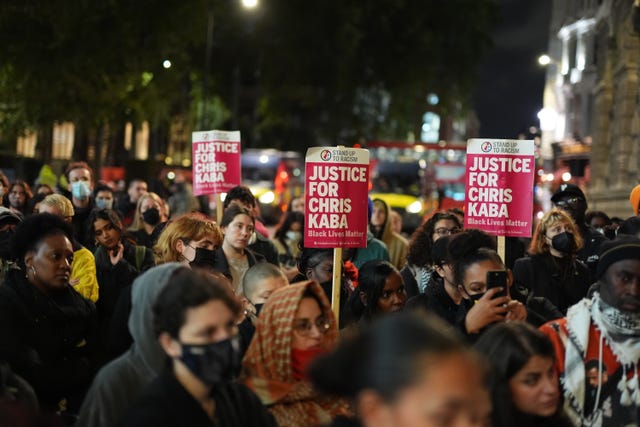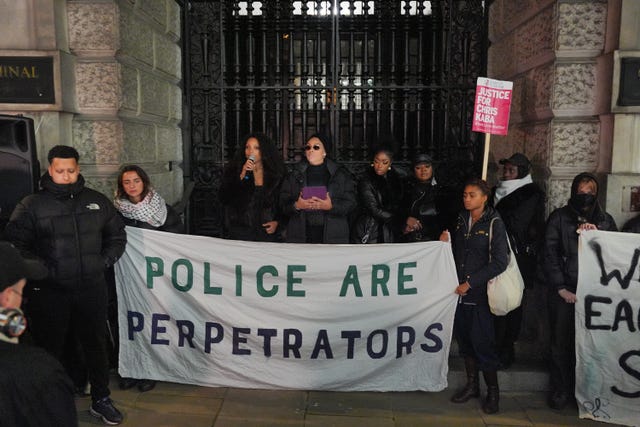Chris Kaba’s family says policing reforms like ‘punishment’ for his case
Families of people who have died in custody said they want to remind the Prime Minister of ‘everybody’s right to life’.

The family of Chris Kaba has said the Home Secretary’s new policing reforms, which include anonymity for prosecuted firearms officers unless they are convicted, were like a “punishment” for his case.
It comes after families of people who have died in custody delivered a handwritten note to Sir Keir Starmer and said they want to remind the Prime Minister of “everybody’s right to life”.
The letter was delivered after hundreds of people marched to Downing Street from Trafalgar Square on Saturday with the United Families and Friends Campaign, which supports the families of “loved ones lost at the hands of the state”.
Home Secretary Yvette Cooper unveiled a string of reforms this week, including that the identity of firearms officers will be kept secret if they are prosecuted unless they are convicted.
Mr Blake, 40, stood trial after shooting Mr Kaba through the front windscreen of an Audi Q8 as the 24-year-old tried to ram his way past police cars in Streatham, south-east London, on September 5 2022.
When reporting restrictions were lifted after the case concluded, it emerged Mr Kaba was a “core member” of one of London’s most dangerous criminal gangs and was allegedly directly linked to two shootings in the six days before he was shot dead by police.
Sheeda Kaba, the cousin of Mr Kaba, said the Home Secretary’s new measures on anonymity for firearms officers were like a “punishment” for her cousin’s case.
Speaking to media outside Number 10, she said: “All that said to us was that we’re tightening the protection of officers because there could never be another officer that gets this far, going to trial.
“So it’s almost like we’re being punished because my cousin’s case got that far within two years. So (with) the smear campaign by the media it’s like we’re dying a second death.
“First they took Chris and now they want to take us. But talking on behalf of my family, we will not be silenced.

Speaking to the PA news agency outside 10 Downing Street, Marcia Rigg, the sister of Sean Rigg, who died in police custody in 2008, said: “We are here to remind him now that he’s the Prime Minister (that) everybody is entitled to their right to life no matter what.
“If there’s a crime then they go to prison and serve their sentence. Not a death sentence. There is no justice.”
Lee Lawrence, whose mother Cherry Groce was paralysed after being shot by police in 1985, said Saturday’s protests outside Downing Street are about “solidarity”.
He said: “(Today) is absolutely important. Today is about solidarity and solidarity’s not temporary.
“We may hear about very few names in the media.
“But as you can see by the crowd outside, many people have died at the hands of the state.
“So today is about us all coming together and showing our collective voice.”

He said: “It’s sad and it just feels like lessons aren’t being learnt and our voices are not being heard.
“The question is what more do we have to do?”
Mr Lawrence described the outcome of Mr Blake’s trial at the Old Bailey as “another disappointing outcome”.
He said: “(It was) another disappointing outcome, but at the same time we’re not averse to that.
“Getting justice is near-impossible in this country. But that’s not gonna stop us.”
The families who delivered a handwritten note to Sir Keir earlier said they have been left “indefinitely traumatised” after losing loved ones “at the hands of the state”.
Speaking outside Number 10, they said: “Families are indefinitely traumatised and impacted on their wellbeing by the hands of the state … this is a vexed question and we want it settled amicably.
“Everybody has the right to life and so do the families.
“And we’re traumatised and it’s painful every time we hear of another death.
Kadija George, the cousin of Sheku Bayoh who died after he was restrained by police in 2015, said it is important to remember the families as victims.
She said: “They need to recognise that it’s the family who are victims.
“So often it’s painted in the press that it’s the people who committed the action (that) are the ones traumatised, the ones who have to take time off work, who have to be cared for.
“Nothing to do with the families. Nothing to do with the victims.”
During the march, some people held signs reading “No justice”, “No-one forgotten, nothing forgiven” and “No to hatred, no to fascism” – and others also held images of people they say died in custody.
A speaker from the Justice for Chris Kaba campaign addressed the crowd as it marched to Downing Street and led a chant of “we believe that we will win” and “the people united will never be defeated”.
An activist stressed to the crowd and press in central London that they were not there “just for the Kaba family”, but for all “grieving” families who are “bereaved at the hands of the state”.
It came as thousands of Tommy Robinson supporters also gathered in central London on Saturday for a planned protest which the political activist will miss after he was remanded into custody by police.
A counter-protest was also taking place, organised by Stand Up to Racism, which has called on its supporters to “take to the streets” in a “massive anti-fascist demonstration”.





